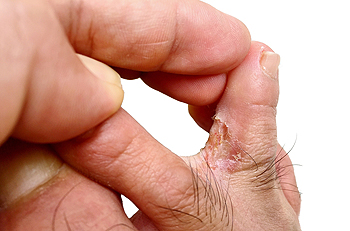There are clear signs that can indicate whether athlete's foot has developed or not. A common symptom related to this condition is the formation of a red rash that may spread all over the afflicted foot and is normally found in between the toes. If left untreated, the rash may spread underneath the foot, leaving the skin looking scaly or chalky. Additionally, the rash may be incredibly itchy, however, scratching the affected area may cause more harm to the skin, which is why it is advised that scratching be refrained. Athlete’s foot is a fungal skin infection that may enter the skin if footwear is not worn in warm, moist environments. Areas where this infection typically spreads can include communal showers, locker rooms, and swimming pools. For advice on how to treat your athlete’s foot or for tips on prevention, we recommend you consult with a podiatrist for professional care.
Athlete’s Foot
Athlete’s foot is often an uncomfortable condition to experience. Thankfully, podiatrists specialize in treating athlete’s foot and offer the best treatment options. If you have any questions about athlete’s foot, consult with Elliot T. Udell, DPM from New York. Our doctor will assess your condition and provide you with quality treatment.
What Is Athlete’s Foot?
Tinea pedis, more commonly known as athlete’s foot, is a non-serious and common fungal infection of the foot. Athlete’s foot is contagious and can be contracted by touching someone who has it or infected surfaces. The most common places contaminated by it are public showers, locker rooms, and swimming pools. Once contracted, it grows on feet that are left inside moist, dark, and warm shoes and socks.
Prevention
The most effective ways to prevent athlete’s foot include:
- Thoroughly washing and drying feet
- Avoid going barefoot in locker rooms and public showers
- Using shower shoes in public showers
- Wearing socks that allow the feet to breathe
- Changing socks and shoes frequently if you sweat a lot
Symptoms
Athlete’s foot initially occurs as a rash between the toes. However, if left undiagnosed, it can spread to the sides and bottom of the feet, toenails, and if touched by hand, the hands themselves. Symptoms include:
- Redness
- Burning
- Itching
- Scaly and peeling skin
Diagnosis and Treatment
Diagnosis is quick and easy. Skin samples will be taken and either viewed under a microscope or sent to a lab for testing. Sometimes, a podiatrist can diagnose it based on simply looking at it. Once confirmed, treatment options include oral and topical antifungal medications.
If you have any questions, please feel free to contact our office located in Hicksville, NY . We offer the newest diagnostic and treatment technologies for all your foot care needs.

